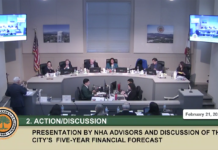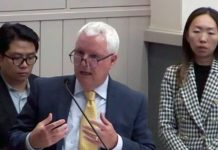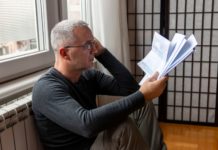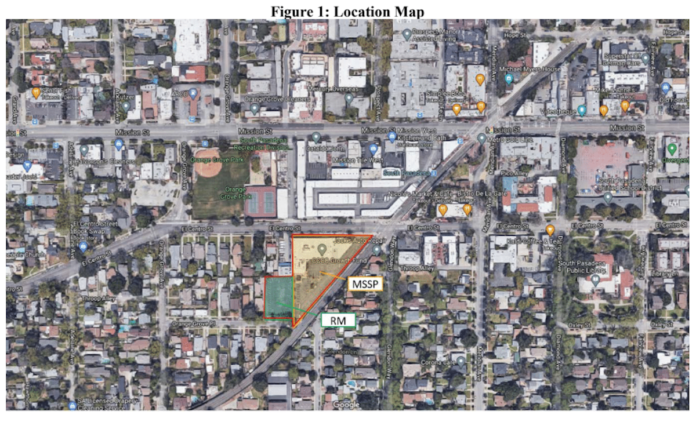The South Pasadena City Council on Wednesday upheld the Planning Commission’s approval of the 60-unit, 6,100 square-foot residential and commercial Seven Patios development to be built without affordable housing units on the south side of El Centro Street along the Goldline railroad tracks.
Although the Planning Commission approved the project Nov. 17, Council Member Richard Cacciotti and former Council Member Stephen Rossi requested a further review to allow additional public comment.
Traffic, parking, and possibility of finding hazardous waste during excavation were the main things on the minds of the project’s neighbors, particularly after resident and long-time environmental specialist Delaine Shane documented potential sources of waste that she argued require a Phase II state environmental study that goes beyond the four ground borings completed by the developer’s geotechnical contractor, Converse Consultants.
Converse maintained additional sampling was not required, since the odors and color of the soils it did extract in May 2018 did not trigger a need for laboratory testing. “It was our opinion that there was not evidence of the presence of a hazardous substance or petroleum product in, on or at the site” Converse Principal Environmental Consultant Laura Tanaka wrote in a Feb. 20, 2021 letter.
Based on representations from Seven Patios attorney Richard McDonald that each soil boring site was selected to be in the location of “alleged historical uses” and deeper than any foundation concrete is slated to reach, and the developer’s voluntary commitment to agree to a soils management plan in the event anything is discovered, the Council unanimously opted to uphold the Mitigated Negative Declaration and related monitoring plan. It also approved a long set of conditions, including 51 from the planning department, 46 from public works, 76 from the building department, 27 from fire and 6 from the police department.
Council Member Jon Primuth asked if it weren’t true that there is no economic advantage for developers to cover up or avoid discovery of contamination.
“They would have an incentive to do the opposite,” McDonald replied. “The last thing you want is a Stephen King novel where you are building something on top of soils and wastes that years later creep up and kill people. The incentives here are toward extraction and removal.” He noted even if the borings showed the need for a Phase II study, the remedy would be what the developer has already included–a soils management plan.
The approval included three new conditions compared to when the review was originally set to be considered by the Council a month ago. Two of these memorialize the soils management plan, which sets a protocol for how any contaminated waste will be handled and removed if discovered.
For her part, Shane does not consider the revised conditions “fully adequate.” She said the borings Converse did were not up to standard and maintained that based on the historic use of the site, there is a “high degree of probability” of soil contamination. Her concerns were shared by resident John Srebalus, who argued Shane’s work resulted in “a demonstrated possibility of industrial chemicals, residential refuse and the carcinogen creosote in the soil at the project site.”
The third new condition is aimed at quelling neighbors’ traffic concerns by allowing only right-hand turns in and out of the development’s only entrance on El Centro St. This “will require the applicant to provide a revised construction drawing, prior to issuance of a grading permit, showing a concrete median installed in the project driveway to prohibit left movements,” according to a staff report prepared by Planning Manager Kanika Kith.
Margaret Muñoz, community Organizer at Abundant Housing LA and resident Brian Bruegge, filed comments supporting Seven Patios, both noting the city’s need for new housing and Bruegge adding the project “as designed is sensitive to the local character of South Pasadena and will further enhance the neighborhood.”
Primuth said the developer addressed all the issues, including bikes and electric vehicle charging. Since the traffic study showed the effect on the “most impacted road segment” was not significant, then the same must be true of other segments in the area. He was also comfortable the strategic boring means “we are going to be okay.”
Cacciotti, who called for the review, agreed. “It’s been a long and incremental process” that’s worked well as the developer addressed issues as they were raised by the community, though it did bother him that “there is not one affordable unit in this project.”
There is still a requirement for a post construction traffic study at the discretion of the city’s relevant commission chairs, which the developer will pay for–though it was clarified at the meeting that any improvements indicated by the study will be the obligation of the city.
Several other conditions were also clarified, including one stating that the developer will be responsible for making sure sewage improvements will be enough for the proposed flow.
The conditions also provide for the removal of 20 trees, and for the planting of 61 new trees, which exceeds the requirement. That was relevant also because during the same meeting, Mayor Mahmud disclosed that South Pasadena was downgraded by the Arbor Day Foundation due to the aging, death, and removal of many of its trees.















.png)








